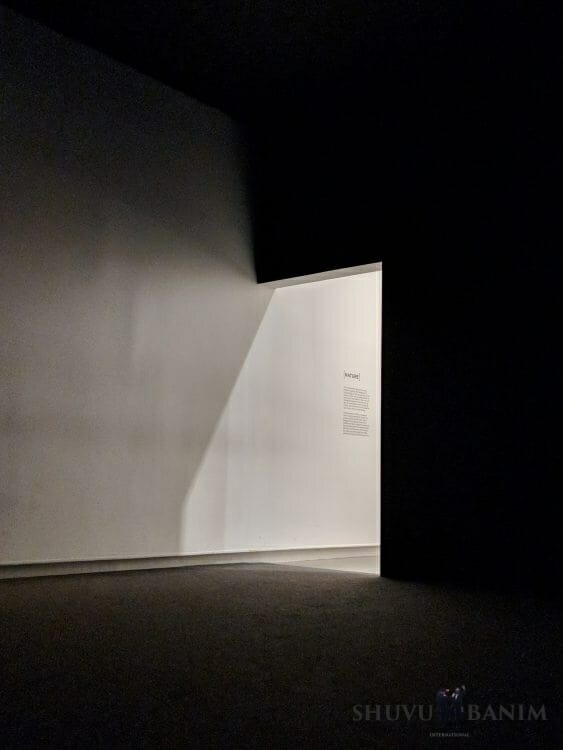Over the last two years, I’ve been developing something of a ‘feeling’ for which people are going to snap and go to the dark side, when it comes to Rav Berland, and which won’t.
Perhaps surprisingly, it doesn’t depend on outward observance of mitzvahs, country of residence or who they choose to vote for.
More and more, I’ve come to realise that it all boils down to just one thing, namely:
How honest people really are with themselves.
Because the Rav will take you to the very end of your bad middot. Whatever your real problem is, the closer you get to the Rav, the more you’ll find it shoved in your face, and the more you will be challenged to finally acknowledge it, and start to deal with it.
And unless you’re prepared to eat a lot of humble pie, and to accept that you’re not as ‘perfect’ and ‘rectified’ and ‘holy’ as you actually thought, you’re going to find that an impossible challenge.
This is how so many of the people who used to be close to the Rav have pinged away, like a bowshot.
For as long as they thought they could use the Rav as a sort of caspomat, or short-cut to defuse all their problems and issues, they were happy to come along for the ride.
But, once the focus started to switch to what they themselves were doing to cause their own problems, once they started to be challenged to actually work on their own shortcomings – they were off like a shot.
And of course, people like this aren’t about to start admitting that the problem is really with them, and their inability to acknowledge their internal ‘bad’, and to have some humility and make some real teshuva.
So instead, they project the whole problem outward, and the main person they project it onto is the Rav.
Which is why the Baal Shem Tov taught that: The Tzaddik is a mirror.
So, my heart fell about 300 miles when I read what the Rav said, a little while back that unless Am Yisrael does some serious teshuva, he’s going to have to take more shame and disgrace and harsh judgement upon himself, to try to sweeten things.
Because you know what that means, right?
That means more machloket, more crazy people making up more crazy stories about the Rav, and more self-righteous psychos indulging in lashon hara festivals online, and in person.
And anyone who’s remotely connected to the Rav will get to ‘share in the suffering’, at least to a very small degree, by having to deal with those psychos and their deranged rantings and threats. And as someone who’s had some minor experience of it, I have to tell you it’s really not fun.
I have books I’ve written – with my real name on – that put me firmly in the Rav’s camp. I write for his website. I’m not shy about telling people how following the Rav’s advice and doing pidyonot with him have all led to massive improvements in so many areas of my life.
So, if the Rav’s reputation takes another public dive, I’m inline to get smacked with a whole bunch more self-righteous drivel, personal attacks and ‘BDS-Berlanding’, where people literally boycotted me and my books and my blog because I was publically supporting him.
Yay! How I’m so looking forward to it.
Not.
It takes an awful lot of humility, an awful lot of emunat tzaddikim to try to stick that out. When people start throwing mud at you day in day out, that’s really not easy to deal with.
Lucky for me, I already know I’m not on the level to hack that for too long, these days, and I’m preparing myself mentally. I know I’ll probably have to cool off for a while, take a back seat, go and do some painting etc, if the heat starts turning up too much.
And worryingly:
I can see some distinct signs that the next round of bad-mouthing, and ‘shame and humiliation’ is poised, ready to begin.
Some of the people I’ve been watching for months, waiting to see if they’re going to fall away and ‘go to the dark side’ are beginning to act the way people do, just before they crack and become bona fide ‘anti-Rav Berland’ psychos. The storm clouds are gathering, albeit I think they are still a little way off in the distance.
And of course, things can always change. More of us can make the teshuva required, get real, and stop pretending that we’re perfect.
That could happen. Bezrat Hashem, it will happen.
But I’m not betting on it.
And if not, and the Rav takes more shame and disgrace upon himself, another scandal, another bout of exile, then I can tell you this:
I’m dreading it.
And I’m probably not alone. But hey, what can we do?
If the Tzaddik says more shame and humiliation is required to sweeten the judgments, who are we to argue? I just hope my own ego can stand up in the test, or rather, lie down in the test, as required.
And if things are going to be as bad as the Rav hinted, that’s going to be a challenge.
- You can read more of Rivka’s musings on her blog: https://rivkalevy.com/



















Bs”d
A tale. There was once a king who had a wise man. The king spoke up to the wise man, “Inasmuch as there is a king whose signature declares that he is a great man of might, and a man of truth, and humble (in other words, a truthful person who does not focus on himself [lit. “hold of himself”]): mighty — I know that he is a great man of might, for the sea flows around his country, and on the sea is stationed a navy on warships with cannons and they do not allow anyone to approach, and inwards from the sea there is a great swamp (a place where one drowns) surrounding the country, through which there is only one narrow path wide enough for only one person to pass; there too cannons are positioned, so that if someone comes to attack, the cannons are fired, so it is impossible to set foot there.
“But his signing himself as being a man of truth and humble — this I do not know, and I want you to bring me this king’s portrait.” For the king had all the portraits of all the kings, but the portrait of that king (who signs himself in such fashion as mentioned) was not found by any king, for he is concealed from people, since he sits under a veil [Yid. forhang, Heb. killah], and he is far from his countrymen.
The wise man went to that country. He came to the realization that he must come to know the essence of the country (in other words, the “thing” of the country; how the country works). And how can he find out the country’s essence? — by way of the country’s jests [Yid. katoves < Slav. katavasnik prankster < Gr. katavasis descent]. Because when one needs to know [the essence of] something, one must know its jesting. For there are many types of jesting: there is one who really wants to smite the other with his words, and when the other takes notice [lit. "looks around"] he says to him, "I am joshing! (Ikh treyb katoves, lit. 'I drive a jest')" as in the verse, "Like one who wearies himself shooting firebrands… and says, 'Am I not joking?'" [Prov. 26:18-19], and so there is someone who really means a jest but still harms the other with his words. Thus there are several kinds of jesting.
Now, among all the countries, there is a country that includes all countries (that is, the country is the principle and rule for all countries), and in that country there is a city that includes all cities of that whole country that includes all the countries. And in the city is a house that includes all the houses of the entire city that embodies all cities of the country that includes all countries. And there in the house is a person who includes the entire house which includes etc. And there, there is someone who makes all the wisecracks and jesting of the entire country.
So the wise man took a large amount of money with him and went there. He saw them making all types of fun and joking. He understood from the jests that the country is full of falsehood through and through. For he saw them making fun of how people are cheated in business, and how he goes to the manistrat (lower court) and there it is utter lies and they take bribery there; and he goes to the sand [higher court, <? Ger. Gesandte, emissary]; and there as well it is utter lies. And they were all making fun and jest, enacting all these things.
The wise man understood from this jesting that the country is full of lies and deceit, lacking any truth in the land whatsoever. So he went and did some commerce in the country and allowed himself to be cheated in the exchange, and went and brought suit before the sands [Yid. sandes, Heb. `arkhaoth registrar, archivers' office < Gr. arkhi, arkhion], they being all full of falsehood and bribes. On this day he gave them bribery; the next day they didn't recognize him.
So he went to a higher sand and there too it was full of falsehood. Until he came before the senat (highest court) and there too it is falsehood and bribery throughout. Until he came to the king himself.
When he came to the king he spoke up and said, "Over whom are you king? The entire country is full of falsehood throughout, from beginning to end, and there is no truth in it here whatsoever." And he began to tell over all the falsehood of the country.
When the king heard his words he bent his ear to the veil to listen to hear his words for it was a great wonder to the king that there should exist a man who would know all the falsehood of the country. And the royal ministers who heard the wise man's words grew very angry at him but he still continues reporting all the country's falsehood.
The wise man spoke up, "One could say that the king is also like them; that he likes falsehood as the country does. But on the contrary one sees what a man of truth you are, and because of this you keep your distance from them: on account that you cannot bear the falsehood of the country." And he began to praise the king very very much.
And the king, because he was very humble — and "in the place of his greatness, there is his humility," for that is the way of a humble man, that the more he is praised and extolled, the smaller to himself and the humbler he becomes — so on account of the wise man's great praise and exaltation of the king, the king entered into great humility and extreme tininess, until he became absolutely nothing; and he could no longer withhold himself and he threw aside the veil to see the wise man: who is it that knows and understands all this?
The king's face was revealed, and the wise man saw him, depicted his portrait and brought it back to the king.
https://en.wikisource.org/wiki/Translation:Tales_of_Rabbi_Nachman/6